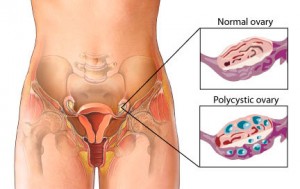 As a woman, it can be rather disheartening to discover that you have polycystic ovary syndrome, especially if you are rather young or are trying to get pregnant. According to the University of Chicago, between five and ten percent of women who are of reproductive age are affected by polycystic ovary syndrome, many of which don’t even know it. While PCOS isn’t a necessary end all for those women who aspire to be mothers someday, but it can make pregnancy rather difficult and can otherwise be a challenge to live with.
As a woman, it can be rather disheartening to discover that you have polycystic ovary syndrome, especially if you are rather young or are trying to get pregnant. According to the University of Chicago, between five and ten percent of women who are of reproductive age are affected by polycystic ovary syndrome, many of which don’t even know it. While PCOS isn’t a necessary end all for those women who aspire to be mothers someday, but it can make pregnancy rather difficult and can otherwise be a challenge to live with.
What is Polycystic Ovary Syndrome?
Caused by hormonal imbalances, polycystic ovary syndrome (PCOS) is characterized by cysts along the outer edges of the ovaries in women who are of a reproductive age. While there is no specific cause of this syndrome, diagnosis typically comes after the woman has noticed increased weight gain or they have had difficulty conceiving a child. Additionally, women with this condition may notice that they have infrequent or longer than normal menstruation cycles, excessive growth of hair and have begun to get acne. If PCOS is gone undiagnosed for an extended period of time it has been found to cause additional complications, including heart disease, sleep apnea and type 2 diabetes.
Is There a Treatment for PCOS?
There are several treatment options available to those women who seek overcome PCOS symptoms, each of which is appropriate for different women based on their symptoms and whether or not they seek to become pregnant.
- Ovulation prescriptions – For women who are seeking to conceive a child, ovulation medications can help to induce ovulation. There are a number of ovulation medications on the market that a physician can prescribe to PCOS sufferers.
- Surgical procedures – In some situations a physician might deem it necessary to perform a surgical procedure to utilize a laser to burn the follicles actually on the ovaries. This is typically the last resort procedure for those women who have had no luck with other forms of treatment.
- Menstrual regulation – For those women who are not immediately seeking to conceive a child, one option to help manage a menstrual cycle is a low-dose birth control pill that can help to reduce the body’s exposure to estrogen. Or, another option that some physicians recommend is taking progesterone for a few days per month to help manage periods as well.
- Natural supplementation – PCOS supplements are available on the market for those who are interested in taking a homeopathic approach to treatment. These supplements are formulated to enhance the function of ovaries and improve the development of ovarian follicles. Additionally, depending on the supplement chosen, some have antioxidants that are intended to reduce testosterone levels so that excess hair, infertility and acne symptoms of PCOS can be addressed.
A diagnosis of PCOS by your physician doesn’t necessarily mean that conceiving a child, or attaining healthy ovaries, is impossible. Thankfully there are a number of options available to women with PCOS and conception could certainly still be possible.
Image Source: http://womenshealth.gov/publications/our-publications/fact-sheet/polycystic-ovary-syndrome.cfm

